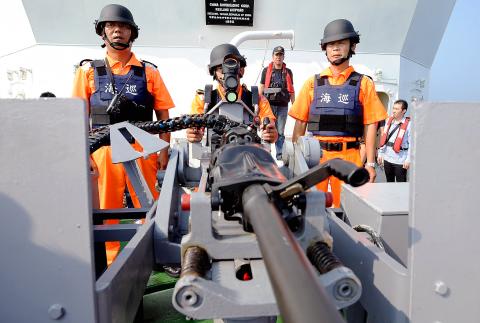The Coast Guard Administration (CGA) publicly demonstrated its procedures for escorting Taiwanese fishing boats operating near the Diaoyutai Islands (釣魚台) yesterday, in what was seen as a fresh attempt to assert the country’s sovereignty over the disputed island group.
A duty changeover between the 500-tonne Lienchiang and the 600-tonne Hualien patrol boats was opened to press and politicians yesterday.
CGA officials said Taiwan currently conducts patrol operations near the Diaoyutais around the clock and that onsite changeovers can help shorten response times in the event of contingencies.

Photo: Chu Pei-hsiung, Taipei Times
At present, the CGA has 161 ships and is expected to expand its fleet to 173 vessels by 2015.
The show of strength followed a decision by the Japanese government on Tuesday to buy three of the disputed islands from their private owner for ¥2.05 billion (US$26 million).
The Diaoyutais, known as the Senkakus in Japan, lie in the East China Sea, about 120 nautical miles (220km) northeast of Taiwan. The island group is claimed by Taiwan, Japan and China.
There have often been reports of Taiwanese fishermen being chased away from the area by Japan Coast Guard ships.
Describing the area as a traditional fishing ground of Taiwanese, President Ma Ying-jeou (馬英九) instructed the CGA to increase its escort profile to provide services on a daily basis during the fishing season.
However, some fishermen have urged the government to take tougher action to protect their rights.
Wu Yao-liang (吳耀亮), a fisherman based in Suao (蘇澳), Yilan County, said Taiwan should vigorously fight for its sovereignty over the Diaoyutais in order to bring Japan’s attention more sharply to the issue.
Meanwhile, Ministry of Foreign Affairs spokesman Steve Hsia (夏季昌) said Taiwan is keeping a close eye on Japan’s moves in the islands dispute.
Hsia’s remarks came after Taiwan recalled its representative to Japan Shen Ssu-tsun (沈斯淳) in response to Japan’s decision to buy the three privately owned islands.
Reiterating that the Diaoyutais are an inherent part of the Republic of China’s territory, Hsia said the nation would uphold its sovereignty over the islands when negotiating with Japan on fishing rights.
Taipei and Tokyo are currently negotiating the timing of the next round of talks on fishing rights, Hsia said, adding that no timetable had been set.
Taiwan would stick with the principles of safeguarding its sovereignty, shelving differences, pursuing peace and reciprocity, and jointly exploring resources to peacefully and rationally resolve territorial disputes, he said.
In related news, the ministry said Taipei does not recognize a unilateral move by the Philippines to rename the South China Sea as the West Philippine Sea of the Republic of the Philippines.
The ministry issued the statement in response to an administrative order recently signed by Philippine President Benigno Aquino III to officially rename the South China Sea.

MAKING WAVES: China’s maritime militia could become a nontraditional threat in war, clogging up shipping lanes to prevent US or Japanese intervention, a report said About 1,900 Chinese ships flying flags of convenience and fishing vessels that participated in China’s military exercises around Taiwan last month and in January last year have been listed for monitoring, Coast Guard Administration (CGA) Deputy Director-General Hsieh Ching-chin (謝慶欽) said yesterday. Following amendments to the Commercial Port Act (商港法) and the Law of Ships (船舶法) last month, the CGA can designate possible berthing areas or deny ports of call for vessels suspected of loitering around areas where undersea cables can be accessed, Oceans Affairs Council Minister Kuan Bi-ling (管碧玲) said. The list of suspected ships, originally 300, had risen to about

DAREDEVIL: Honnold said it had always been a dream of his to climb Taipei 101, while a Netflix producer said the skyscraper was ‘a real icon of this country’ US climber Alex Honnold yesterday took on Taiwan’s tallest building, becoming the first person to scale Taipei 101 without a rope, harness or safety net. Hundreds of spectators gathered at the base of the 101-story skyscraper to watch Honnold, 40, embark on his daredevil feat, which was also broadcast live on Netflix. Dressed in a red T-shirt and yellow custom-made climbing shoes, Honnold swiftly moved up the southeast face of the glass and steel building. At one point, he stepped onto a platform midway up to wave down at fans and onlookers who were taking photos. People watching from inside

Japan’s strategic alliance with the US would collapse if Tokyo were to turn away from a conflict in Taiwan, Japanese Prime Minister Sanae Takaichi said yesterday, but distanced herself from previous comments that suggested a possible military response in such an event. Takaichi expressed her latest views on a nationally broadcast TV program late on Monday, where an opposition party leader criticized her for igniting tensions with China with the earlier remarks. Ties between Japan and China have sunk to the worst level in years after Takaichi said in November that a hypothetical Chinese attack on Taiwan could bring about a Japanese

STREAMLINED: The dedicated funding would allow the US to transfer equipment to Taiwan when needed and order upgraded replacements for stockpiles, a source said The US House of Representatives on Thursday passed a defense appropriations bill totaling US$838.7 billion, of which US$1 billion is to be allocated to reinforcing security cooperation with Taiwan and US$150 million to replace defense articles provided to the nation. These are part of the Consolidated Appropriation Act, which the US House yesterday passed with 341 votes in favor and 88 against. The act must be passed by the US Senate before Friday next week to avoid another government shutdown. The US House Committee on Appropriations on Monday unveiled the act, saying that it allocates US$1 billion for the Taiwan Security Cooperation Initiative